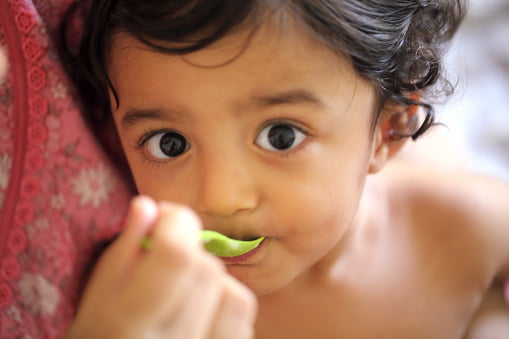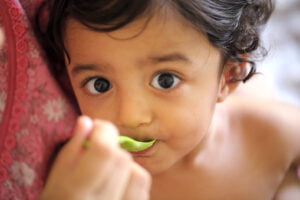8 Common Baby Food Feeding Mistakes
- Published on:
- Last update: 13 November 2023

Common Baby Food Feeding Mistakes
Feeding is undoubtedly one of the biggest challenges that parents face during their baby’s early years. We sometimes find our little ones to be temperamental and moody at times when it comes to eating and drinking, especially after we have transitioned them from breastfeeding or formula to solid foods.
The meals we serve our babies should be healthy, complete, and digestible. Nevertheless, there are a few feeding mistakes that can have a negative impact on a baby’s nutrition and should be avoided.

A list of common mistakes you must avoid while bottle-feeding your baby can be found below. Pediatricians recommend keeping these pointers in mind to make sure that our babies get a healthy diet during their developmental stage.
The Baby Should Be Introduced to Solid Food Right Away to Sleep Better
Quite a few parents believe that solid foods help fill up the baby’s stomach properly, allowing him to sleep well at night. Since this is the case, we often introduce solid food to toddlers before they reach 4 to 6 months of age. Doctors do not, however, recommend introducing solid food before this age. Sleeping longer after eating solid food is unfounded based on the fact that the baby ate solid food.
It is recommended to exclusively consume breast milk (or formula) during the first few months of life. Towards the end of this time period, solid food should be introduced.
Introducing Cereal Before 6 Months
Many parents introduce cereal to their babies early because it is regarded as one of the best foods for babies. Cereal is still considered a safe and nutritious food to be consumed by young infants before six months, regardless of the delay in starting other solid foods, such as daal khichdi.
Furthermore, pediatricians are not recommended for this practice as well. Infants are still growing and do not have fully developed digestive tracts. Baby cereal is not recommended before six months because it could cause constipation in the baby and make him irritable.
In the event your baby is still hungry after feeding, you might need to increase the frequency of feeds. In the event of limited milk production, you may want to talk to your doctor about supplementing your milk production with formula.
A pediatrician may recommend feeding cereal to your baby in a bottle if he or she has reflux problems. But this is done in order to prevent the food from flowing back up the stomach. It is not advised to attempt this without consulting your doctor.
Too Worried About Babies Spitting Up Their Food
When you see your baby spitting up milk after a feed, you may be worried. Baby food feeding does not need to worry parents too much because babies spit up milk or other solid food as it is normal. Generally speaking, acid reflux of this type is a fairly common condition.
As a result of the valve connecting the esophagus and stomach not operating properly, vomiting occurs. Consequently, food from the stomach enters the mouth.
The problem will subside over time without any intervention. To ensure your baby is digesting food properly, make sure your baby burps after every feeding. When you try these home remedies for acid reflux in babies, spitting up can be a problem.
Introducing Solid Foods Too Late
The introduction of solid foods should not be delayed beyond 6-9 months at most. Too early introduction of solid foods is also considered a mistake. The doctors say that infants who don’t eat solid food before nine months are more likely to develop aversions to it. Your baby may experience difficulty biting, tasting, or experiencing some textures of food.
While this period is critical for breastfeeding, breast milk or formula is still essential. You should make sure that your baby gets a taste and feel for solid food.
Failing to Observe Choking Hazards
Throughout our lives, we consume many seemingly harmless foods that could end up choking our babies. Your baby will start experimenting with finger foods as he gets older, pulling up pieces of food and putting them in his mouth. We need to be aware of choking hazards more than usual during this time. While the baby may have started chewing, his teeth have not fully developed.
Whenever possible, avoid giving your baby large amounts of food or letting your baby lie down while eating. The following are some other choking risks or baby food feeding mistakes that parents must be alert to.
Feeding Foods That Are ‘Too Healthy’
This is becoming an increasingly common mistake in our modern age – we tend to overthink ‘health’ in regards to baby’s food, choosing low-fat, organic, or genetically modified (e.g. seedless) foods. The pediatricians recommend that infants should eat real food. It is best not to give a baby low-fat foods (e.g. low-fat butter) since babies need healthy meals or baby food feeding to grow up with.
The practice of restricting a baby’s meals to fruits and vegetables is also not recommended. This type of food is nutritious, but it is also filling, limiting your baby’s exposure to meat, dairy products, and vegetable protein sources.
Spoon-Feeding For Too Long
There has been a connection between this baby food feeding mistake and childhood obesity. Research indicates that babies who are spoon-fed for a long time are at a much greater risk of becoming obese later in life. This is primarily because they are unable to recognize fullness and when they have eaten enough food. As soon as a baby is allowed to handle food himself, he can control how much is consumed.
Generally, doctors recommend that babies begin feeding themselves between 8 and 9 months old. If your baby shows signs of readiness, you can now start introducing a spoon to him on his own. They include holding his head steady or grasping food with his hand/fingers.
Feeding Allergy-Triggering Baby Foods
You need to be careful with certain foods that might seem healthy at first, but may cause allergies for your baby. Despite the fact that doctors no longer believe that common allergen-causing foods such as peanuts, shellfish, and egg whites need to be completely avoided, it is a good idea to discuss them first with your child’s pediatrician.
Depending on your needs, you might need to limit your consumption of these trigger foods and avoid baby food feeding mistakes.
When you have a history of allergy or eczema in your family, you will need to be especially careful.
The Bottom Line
It is vital to remember that mistakes can happen, and one can never be too careful. Make sure you are prepared for these circumstances and know what you should do in them. Take time to observe when introducing solid foods and to keep an eye out for allergies. It is best not to force-feed your child and for feeding to be a fun activity that is shared between both parents and children. If you are in doubt make sure to consult a pediatrician.
Share this post:

